- Home
- Alistair Moffat
The Night Before Morning Page 10
The Night Before Morning Read online
Page 10
His wife began to sob, turning her face away, unable to watch as Ormiston was strung up, both men hauling up the corpse until it swung clear of the ground before tying off the rope on one of the struts. Shock rippled through the crowd, mothers hid their children’s faces, pulling them towards them. There was a sign pinned to the old man’s chest: My wife will die because of me.
‘No! No!’ Agnes Ormiston screamed as she was dragged to the gallows, stumbling, held up under her arms by two soldiers. ‘Please, no,’ she panted, ‘it’s not right. We’ve done nothing wrong.’
She saw neighbours, old friends: ‘Jamie, Archie, help me! Help me! Please!’
Many turned away but the crowd seemed to surge forward as the old lady was made to stand beside her husband’s body. One of the soldiers rattled a volley of machine gun fire over their heads.
‘No, no!’ Agnes screamed before another smashed her in the face with the butt of his gun.
Moving quickly now, following Schneider’s orders, knowing that if they rushed them, the crowd could overwhelm the execution detail, the soldiers pulled the noose over the woman’s head and savagely pulled it tight around her neck, silencing her screams. When they began to haul her upwards, she wriggled when her feet left the ground, her legs kicking, one shoe falling off. Warm urine ran down her legs, dripping.
As Agnes Ormiston began to choke to death and her face turned purple, it seemed to some that what they saw was so unbelievable that it could not be happening. It was a waking nightmare. An old lady, well known and liked in the village, had been beaten and then executed on St Boswells Green, where the fairground stalls set up each summer and the gypsies came to tell your fortune.
It was an impossible sight, and act of appalling cruelty, but in the new Scotland, it was far from unbelievable.
*
‘My God,’ I said when Katie related what had happened on St Boswells Green. ‘I feel responsible. It’s my fault. It’s medieval, utterly ruthless, sadistic. But effective. Someone has already been talking to the Germans. Otherwise, how did they know to stop Sandy Ormiston?’
The news of the atrocity at St Boswells had crackled like wildfire around the Borders. When Katie and her parents heard about it, they knew they had to act straight away – the Germans could be at the door of the farmhouse at any moment.
Katie had run to the stables and threw a saddle on the old pony. The bitter east wind bleared her eyes as she kicked on the sturdy little Highland up the Roman road to Whitton Edge, the place where magnificent views opened. Ignoring them, intent on getting to the shieling at Bleaklaw Moss as quickly as possible, Katie paid attention to nothing except the ground in front of her.
Relieved to see that there was no telltale smoke blowing from the chimney of the shieling but anxious that none of the ponies could be seen grazing anywhere nearby, Katie pushed open the wooden door. The room was completely empty: there was no sign of any kit and the saddles and bridles had gone.
‘Gone this morning.’
She whirled round to see the little man crouched in the doorway.
‘I show you.’
With that, he turned and began running across the wide moorland, beckoning Katie to follow. His agility in skipping across the ridges, swales and dips of what was awkward ground was astonishing and even on her surefooted Highland, bred for this kind of country, she struggled to keep up.
They joined the old road about a mile below the shieling and made even better time. Beyond a dyke, Katie made out the rectilinear banks and ditches of what she thought must be a series of Roman camps. At the foot of a gentle slope, she exhaled with relief when she saw Wilson, Campbell and myself by the banks of a wide stream. Delighted we had come to no harm, she turned to thank the man, but he had vanished.
Whistling as loud as she could – and that was loud – Katie stood up in her stirrups and waved at us.
‘It’s barbaric, what they did to Sandy and Agnes Ormiston, utterly barbaric. It brings it home, the savagery we saw in Europe,’ I said.
Wilson and Campbell were still open-mouthed at what Katie had described.
I was angry, but also fearful, very anxious about all of our families, and I could see that both men were thinking of their own people.
We mounted our ponies and trotted briskly back up the old road.
‘Others will talk,’ I said. ‘Someone will give up the names of your mum and dad, and my dad. Even if they are three amongst many, the Germans will be thorough.’
*
Never having imagined that they would be forced to leave their farmhouse with an hour’s notice, Alan and Eileen Grant had to think quickly. Grant’s father had moved out of his draughty old house and gone to live with a widower neighbour. They would stop at a telephone box en route and call him to tell him they had left the farm but not where they had gone. And his son would insist that he went nowhere and would not give away his whereabouts.
Food, drink, changes of clothing and weapons was the rubric as they packed as much as they could into their car. What about valuables, apart from money? Forget that. Maybe some jewellery. But waterproofs, definitely. They would need those when they reached the coast.
Moored for the winter in the tiny inner harbour at St Abbs, next to the launch ramp of the lifeboat station, there bobbed Alan Grant’s passion: what he called a masterpiece and his wife called a floating gin palace. As often as farming allowed, Alan sailed his little wooden yacht through the spectacular coastal waters of Berwickshire, its cliffs unrivalled, its skerries dangerous.
One of about four hundred made at the yard of an American designer, Nat Herreshoff, the yacht was only sixteen and a half feet long – too small for a gin palace but big enough for two berths. Single-masted, it moved sleek and steady through the water, and could turn on a sixpence to catch the wind. If Alan and Eileen could get to St Abbs, they could conceal themselves in the cabin for the night and then, if the weather was good, move on up the coast the following day to find an anchorage where they would not be seen.
‘Surely these thugs can’t take reprisals just because someone disappears?’ said Alan as he fired up his bronchitic old Vauxhall.
‘Don’t be so sure,’ said Eileen. ‘And if they come here and find a locked and empty house, they’ll know that they have probably found the link with Sandy Ormiston. Then they’ll come after us.’
Instead of driving down to the main road, the Grants followed a loaning, a bumpy farm track that wound its way close to the Waterloo Monument, and from there they would cross the Teviot below Nisbet. Avoiding the towns and larger villages, the plan was to thread their way around the foothills of the eastern ranges of the Cheviots and then dash for the coast.
*
Travelling in the opposite direction, we were making good time. But it was late afternoon when we stopped about half a mile from the Grants’ farm. While Wilson and Campbell kept the ponies quiet, Katie and I moved close enough to see lights burning in the farmhouse.
‘Good. That’s good,’ said Katie. ‘We can feed the horses and find comfort and food for one night.’
But as she made to stand up and run towards the house, I pulled her back. Angrily, she tried to free her arm.
‘Listen,’ I said, ‘just listen.’
And faint in the quiet of the gloaming, we heard the harsh snap of commands given in German.
‘Oh, my God. My God. Mum. Dad,’ whispered Katie.
Begging her to stay put, I made my way even closer, edging along the shelter-belt and managing to get across the track by the steading. After a few long minutes, I heard car doors slamming and engines revving. Risking revealing myself, hoping no driver was looking in a rear-view mirror, I saw an armoured car and what might have been a black Mercedes bumping down the farm track to the main road. And there were no longer any lights on in the farmhouse.
When Katie and I pushed at the half-open front door, the beam of my torch lit a scene of devastation. A hall cupboard had been pulled over, chairs lay upended on the floor and, in the
drawing room, it seemed that everything breakable had been smashed. Papers from Alan Grant’s desk had been strewn all over the floor. Katie was stunned. Upstairs it was the same, chaotic and, it seemed to me, willfully destructive mess.
‘Oh God,’ gasped Katie, ‘they’ve taken them. They’ll kill them. Help me, David. We must go after them.’
But I was not so sure. Perhaps the Grants got away before the Germans kicked in their front door. The mess looked to me more like frustration than an organised search. And when I showed Katie that the Vauxhall was not in its usual place, under an arch in the cartshed, she almost wept with relief.
*
It was nearly dark when Alan Grant turned down the steep hill to St Abbs. The sight of it perched on the cliffs, and the quiet, dark sea beyond, lifted their hearts. No one seemed to be about.
Little more than three parallel lanes with most of the houses facing out to sea, the little fishing village was ancient. Its rocky haven had been used since the seventh century, when an Anglian nunnery had been founded by a princess, St Aebbe.
Although everything about his appearance – his square shoulders, calloused hands and weathered face – said farmer, Alan Grant was also deeply interested in history, in the land and its stories. He had read everything he could find about the village and loved the story of St Cuthbert, who, as a visitor to the community, decided one night to go down to the shore so that, like many of these ascetic old saints, he could mortify his flesh in the ice-cold waters of the North Sea, sing psalms and offer up prayers. A curious novice monk followed him and watched a miracle. When the saint emerged from the water, two sea otters dried his feet.
A gentle tale that ran through Alan’s mind as he and his wife fled from savagery.
*
Before we left the farmhouse, I took one of Katie’s father’s overcoats and a black trilby hat.
‘What do you want those for?’ Katie asked.
‘It might be helpful at some point not to look like a British soldier in dirty old fatigues.’
By the time we rejoined Wilson and Campbell, I had decided that we needed to get to Abbey House and my own father as soon as possible. If the Germans had made a link between Sandy Ormiston and the Grants, they might make another one. The little commandant at Berwick knew my name and he would still be smarting at the breakout. His soldiers and the Gestapo men who had beaten Sandy to death would be asking questions. And the terrified people they spoke to would be giving them answers – anything to make them move on, leave them alone.
Our difficulty was the Tweed: Abbey House was on the far side and not only would the bridges be watched, the winter snows made the fords impassable.
‘What about the railway viaduct?’ suggested Angus Wilson. ‘I reckon that if we can get onto the railway track, we wouldn’t be seen, at least not easily.’ With his huge hands, used to holding up a horse’s hoof and banging clench nails through a shoe, the big man was animated, pointing the way. ‘If we lead the ponies, don’t ride them’ – the relief was etched on Wilson’s face as he said this – ‘we’ll not be seen, not in the dark.’ Seeing the sense of this as he spoke, the words came tumbling out of the normally taciturn farrier’s mouth, and I was glad to have someone else take the initiative. ‘I’m pretty sure the line goes through cuttings mostly,’ he went on. ‘When we get to the big viaduct over the Tweed, we should keep to the far side, the western side. That way, we’ll not be seen by sentries down on Leaderfoot Bridge. It’s a lot lower and on the east side. If we keep low, they’ll not see us.’
It was risky but I could think of no other way to get across the river. And the railway line was only half a mile north of the Grants’ farmhouse.
A gusting east wind blew in flurries of snow as we climbed down the shallow slopes of the embankment onto the track. We had nothing to cover the ponies’ saddles and when, or if, we remounted, they would have to be dried somehow, otherwise Wilson and probably everyone except Katie would slither off. Walking between the rails and on the gravel between the sleepers was awkward, and even though we were concealed I felt that we were making a lot of noise. The mass of Eildon Hill North loomed up out of the mirk on our left-hand side. When the railway line at last emerged from a cutting, we found ourselves approaching the river and the high bridge across it.
We could see no lights on the parapets and no barriers. But below us to our right was the road bridge and, sure enough, we saw two sentries light cigarettes. They were close, less than a hundred yards away, and we needed to move slowly and silently.
The wind and the snow made progress dangerous. Because only trains on a single track crossed the viaduct, it was narrow, and the parapet was low with only an iron railing between us and the black waters of the Tweed below. What made it more perilous was that the space between the track bed and the parapet was a raised concrete walkway wide enough for human beings but challenging for chunky, four-legged ponies. They turned out to be very uncertain, and kept stopping, planting their feet. Katie, the most confident and experienced rider, led us but had often to double back to coax a hesitant pony. She scratched their withers, quietly clicked and cooed at them until they finally put one foreleg in front of another. Wilson was behind her, and since the big man was not confident, that transmitted itself and made his pony refuse to go on. Katie had to pull one foreleg forward and then another. And all the time, two German soldiers patrolled the bridge below us.
And then Wilson’s pony snorted loudly. We froze. But no challenge came from the sentries. After an agonising twenty minutes or so, we finally reached the northern bank of the river and left the vertiginous heights of the viaduct behind.
After fording the Leader Water, we turned east. I felt as though I had at last entered home territory, my own beloved countryside, farms that had been in our family for generations. Even in the darkness of midwinter, I sensed it, knew exactly where we were. I had thought about this moment hundreds of times in the previous year, but never imagined that after the war I would return home like a thief in the night.
We made our way up Bemersyde Hill to a place where people often stopped to gaze west to the three Eildon Hills. One of these people was reputed to be Walter Scott, and the charabanc trade eventually dubbed this vantage point Scott’s View. Before the war, many often assumed that such places were the great beauty spots of the Borders, along with the ruined abbeys and the grand houses and castles. But none of these lifted my heart as much as the fields around Dryburgh. Best seen in an evening sun, they are beautiful to me. Settled, peaceful – except at harvest time – productive and made by the day-in, day-out labour of generations, the fields seem gentle, unassuming, not statements like castles or a great church. Such buildings are thought of as grand, and it is precisely because the fields are not that I love them so much. And even though his name was given to a view and his house at Abbotsford is considered picturesque, I think that what Scott liked about the view from Bemersyde Hill was not just the rising majesty of the Eildon Hills but the cultivated, cared-for detail of the patchwork of fields around them.
When we reached the steep slope of the road that passes the home farm, I pulled up my pony and motioned for us all to dismount and keep quiet. I handed my reins to Katie and climbed up the bank by the road. As a child, I had roamed across every inch of this ground and I knew that we were still high enough to look down on the ruined gable of the south transept of Dryburgh Abbey and, beyond it, my father’s house. Not absolutely certain, I thought I could see a pinprick of light, perhaps the lit window of the drawing room.
Skirting the abbey, and the hotel between it and the river, I wanted to approach Abbey House from the east. There were trees and welcome dark shadows on either side of the drive. By the time we were close enough to be sure that the lights were indeed on in the drawing room, I could not make out the shapes of any vehicles in front of the house. And there was no sign of my father’s old Bentley. While Wilson and Campbell held the reins of our ponies, Katie and I crunched over the gravel to the front door
.
What greeted us inside was more wreckage, more wanton destruction. Just as at the Grants’ farmhouse, the Germans had left a trail of gratuitous violence, smashing mirrors, vases and pulling out and emptying every drawer on to the floor.
But in the dining room, next to the grand fireplace, the concealed entrance to the priest hole was closed, had not been discovered. Thank God.
In case my father was armed, and almost certainly badly frightened, listening to all the commotion that had raged around his house, I knocked gently on the panelling.
‘Dad. It’s me, David. Are you okay?’
There was silence. No movement I could hear. I knocked again. No response. When I pressed on the place in a corner of the linen-fold panel by the mantelpiece and the narrow door swung open, the priest hole was empty. On a shelf there was a bottle of water and a biscuit tin, unopened.
They had taken him.
*
‘Your lordship’ – Sergeant Bell was wide-eyed with surprise to see my father walk into St Boswells police station out of the snow – ‘it’s long after curfew, sir.’
The shoulders of my father’s long raincoat had epaulettes of snow and the brim of his hat was rimmed with white. ‘I am here to see the commandant who was in charge of the business on the Green today.’
Just as the sentence ended, Schneider appeared beside Sergeant Bell behind the counter. ‘Ah, Lord Erskine, I take it. We’ve been looking for you. Your son has caused great difficulty and, I am afraid, is guilty of treason. Have you come to give yourself up?’
My father stared for a silent moment at the little commandant, pulled his shotgun out of the folds of his raincoat, fired both barrels at point-blank range and blew the German’s head off.
VII
A gentle breeze drifted in off the sea, clinking the halyard against the top of the mast, a sound that made Alan Grant smile, no matter the circumstances. And echoing in the distance, he could hear the eerie calls of the seals. Hauled up on the sandbank in Coldingham Bay, a little way down the coast, scores of them howled in the wind, like sea-wolves. It was low tide at St Abbs and the inner harbour had emptied completely, leaving Alan’s beloved yacht yawed to one side. It was late when they parked their car by the pier, and there seemed to be no one about. As in most towns and villages, the curfew was respected. But who knew who was watching?

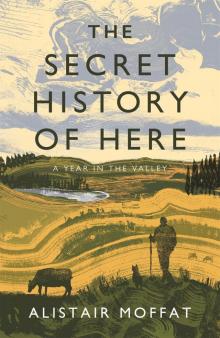 The Secret History of Here
The Secret History of Here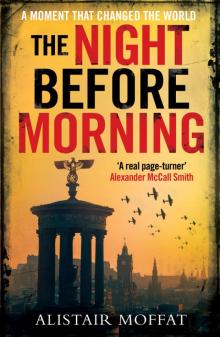 The Night Before Morning
The Night Before Morning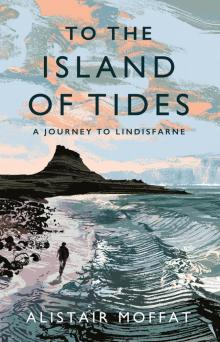 To the Island of Tides
To the Island of Tides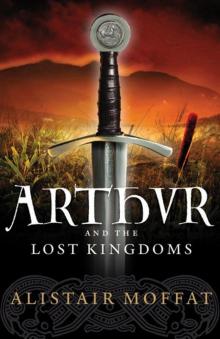 Arthur and the Lost Kingdoms
Arthur and the Lost Kingdoms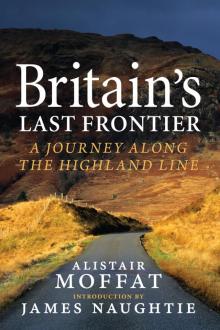 Britain’s Last Frontier
Britain’s Last Frontier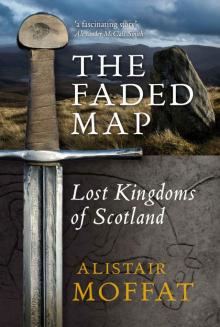 The Faded Map: The Lost Kingdoms of Scotland
The Faded Map: The Lost Kingdoms of Scotland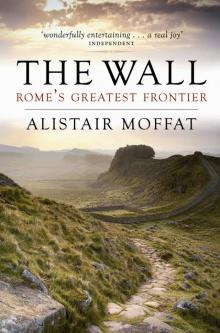 The Wall
The Wall